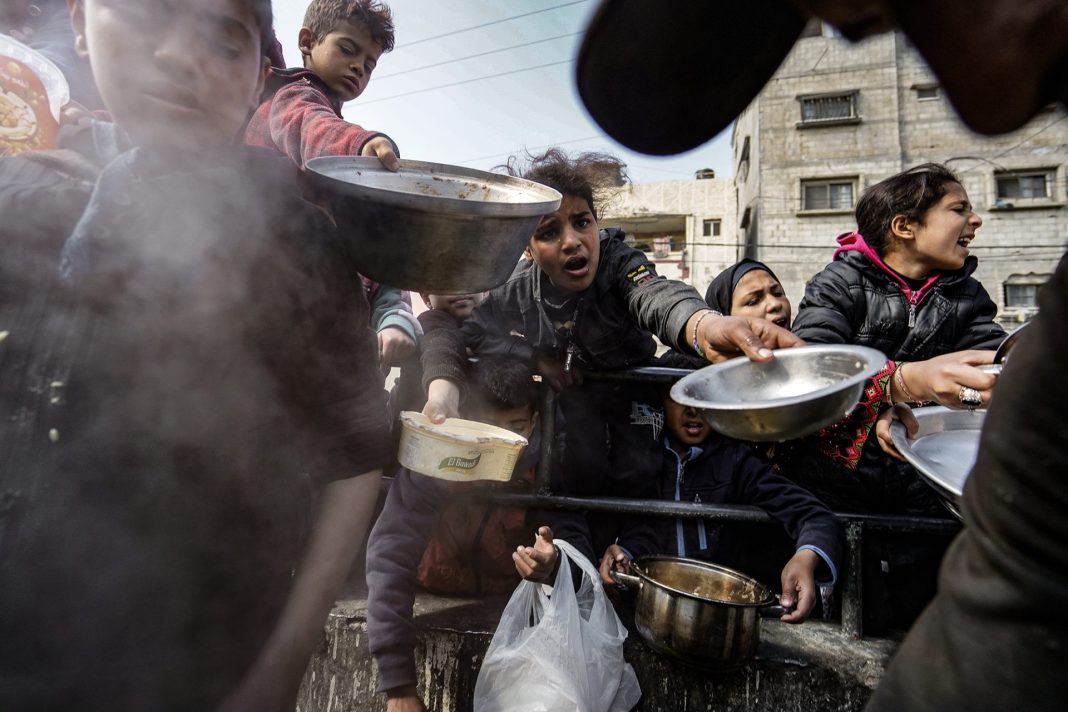“The movement intends to suspend negotiations until aid is brought into northern Gaza,” a senior government source told AFP on Saturday.
“Negotiations cannot be held while hunger is ravaging the Palestinian people,” he said, asking not to be identified as he is not authorised to speak on the issue.
Talks have been held in the Egyptian capital Cairo this week to bring about a pause in fighting in Israel’s four-month-long offensive in Gaza.
The outcome of the negotiations is still unclear and Israel is preparing to move into the southern Gaza Strip city of Rafah as part of its mission to destroy Hamas.
But there have been mounting calls, including from Israel’s closest international allies, not to go into the city, because 1.4 million displaced Gazans sheltering there have nowhere else to go.
The UN’s World Food Programme has warned that Gazans are inching closer towards famine, with concern highest about the north of the coastal territory because aid agencies are unable to get in.
The head of the UN humanitarian agency OCHA in the Palestinian territories, Andrea De Domenico, stated he had “no idea” how an estimated 300,000 people still in the north had survived.
“What we managed to bring up there is absolutely not enough. It is pure misery,” he told AFP this week.
Calls have increased for more trucks carrying aid to be allowed into Gaza, but Israel has tightened checks it says are necessary to prevent Hamas leaders from escaping and arms being smuggled in.
Hamas chief Ismail Haniyeh has also blamed Israel for a lack of progress in achieving a ceasefire deal in Gaza, the group has announced in a statement.
Haniyeh said on Saturday the Palestinian group would not accept anything less than a complete cessation of hostilities, Israeli withdrawal from Gaza, and “lifting of the unjust siege”.
“It is clear so far that the occupation [Israel] continues to manoeuvre and procrastinate on the files of interest to our people, while its position revolves around the release of prisoners held by the resistance,” Haniyeh stressed.
He added that Israel must also free Palestinian prisoners serving long sentences in any upcoming swap deal.
In a speech delivered later on Saturday, Israeli Prime Minister Benjamin Netanyahu called Hamas’s demands “delusional”, and said that a new deal to release captives “does not appear very close”.
In the face of widespread international condemnation, Israel has insisted it will soon launch a ground invasion of Rafah. It is where an estimated 1.4 million of the enclave’s 2.3 million population has been forcibly displaced in Israeli attacks across Gaza in the four-month conflict.
Netanyahu reiterated in his speech on Saturday that Israel would press ahead with its planned attack, even if a deal to release captives was reached.
But six humanitarian and human rights organisations have warned of the “catastrophic” consequences of an Israeli ground offensive in Rafah.
The joint statement was signed by the heads of Oxfam, Amnesty International, ActionAid, War Child, the Danish Refugee Council and Handicap International.
“If Israel launches its proposed ground offensive, thousands more civilians will be killed and the current trickle of humanitarian aid risks coming to a complete halt. If this military plan is not stopped immediately, the consequences will be catastrophic,” the statement read.
European Union’s foreign policy chief Josep Borrell also renewed calls for Israel to avoid taking military action in Rafah.
Such action would “worsen an already catastrophic humanitarian situation”, Borrell wrote on X.
On Friday, US President Joe Biden stressed he repeatedly told Netanyahu there “has to be a temporary ceasefire” in Gaza during “extensive” conversations this week.
Biden added he cautioned Netanyahu against moving forward with a military operation into Rafah without a “credible and executable plan” to protect Palestinians sheltering there.
